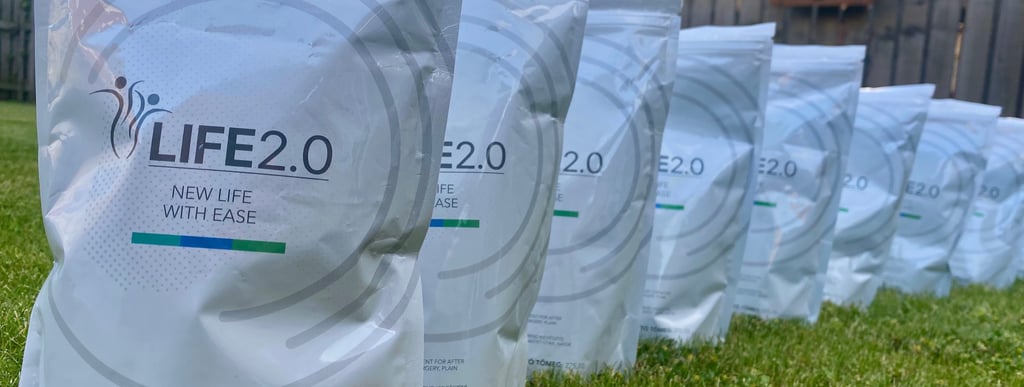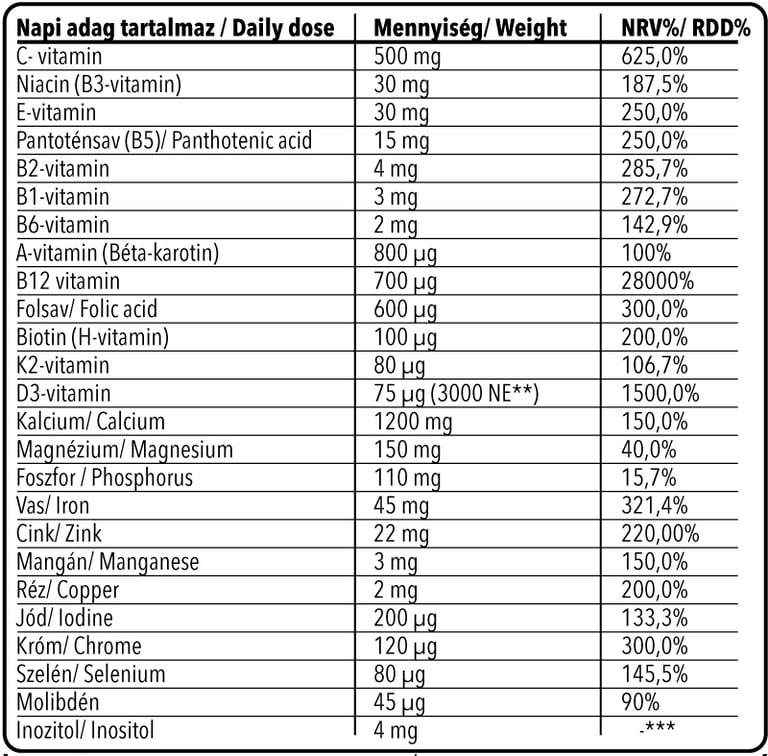Nutritional Deficiencies after Bariatric Surgery
Iron
Iron is important in making red blood cells, which carry oxygen in the body. A lack of iron can lead to iron deficiency anaemia. The daily requirement is 8.7-14.8mg. Typically, you should be able to get all the iron you need from your normal diet, however the majority of the iron absorbed during digestion is absorbed in the duodenum, meaning the absorption after weight loss surgery is very limited.
Additional iron intake is required to make up for this: 45mg daily is recommended, and up to 100mg for women with heavy periods, as they are at higher risk of iron deficiency anaemia.
LIFE2.0 Multivitamin contains 45mg of iron per daily dose.
Due to reduced food intake and the altered gut anatomy after weight-loss surgery, it is common for patients' bodies to have impaired vitamin and mineral absorption. Therefore, lifelong nutritional monitoring and follow-up is an essential component of bariatric surgical care.
The British Obesity and Metabolic Surgery Society issued updated guidelines around this in 2020, [1]. The LIFE2.0 multivitamin and its suggested intake was designed with these in mind. Below is a breakdown of the essential vitamins and minerals supplemented by LIFE2.0.
Thiamin (Vitamin B1)
Thiamin (vitamin B1), helps the body to break down and release energy from food, and keep the nervous system healthy. The amount of thiamin adults (aged 19 to 64) need is 1mg a day for men, or 0.8mg a day for women. Thiamin cannot be stored in the body, so you need it in your diet every day. Thiamine is a water-soluble vitamin that is absorbed in the jejunum, so people are at high risk of developing thiamine deficiency post bariatric surgery. Standard multivitamins and mineral supplements containing thiamine may not be sufficient to prevent deficiency. If people present with prolonged vomiting, dysphagia, poor nutritional intake, inability to tolerate vitamin and mineral supplements, high alcohol intake or fast weight loss, additional thiamine supplementation should be administered immediately to prevent the development of Wernicke's encephalopathy.
LIFE2.0 Multivitamin contains 3mg of thiamin per daily dose.
Calcium
Calcium has several important functions, including helping build strong bones and teeth; regulating muscle contractions including your heartbeat; and making sure blood clots normally. A lack of calcium could lead to a condition called rickets in children, and osteomalacia or osteoporosis in later life. Adults (aged 19 to 64) need 700mg of calcium a day. Calcium absorption is adversely affected by bariatric surgery. It is recommended that adults take 1200 to 1500mg calcium per day following sleeve gastrectomy or gastric bypass, preferably in calcium-citrate form, which has more bioavailability.
LIFE2.0 Multivitamin contains 1200mg of calcium per daily dose.
Folate
Folate (vitamin B9) is found in many foods. It helps the body form healthy red blood cells and reduces the risk of birth defects called neural tube defects, (such as spina bifida) in unborn babies. A lack of folate could lead to folate deficiency anaemia. Adults need 200 micrograms of folate a day, and double this amount during pregnancy. There are no long-term stores of folate in the body, so you need to eat folate-rich foods frequently. Folate is actively absorbed primarily from the upper third of the small intestine, therefore absorption after gastric bypass is very limited.
400 micrograms minimum is the recommended daily intake after weight loss surgery, and higher during pregnancy as before.
LIFE2.0 Multivitamin contains 600 micrograms of folate per daily dose.
Vitamin B12
Vitamin B12 is involved in helping the body make red blood cells, keep the nervous system healthy, release energy from food, and use folate. A lack of vitamin B12 could lead to vitamin B12 deficiency anaemia. Adults (aged 19 to 64) need about 1.5 micrograms a day. After weight loss surgery the risk of developing vitamin B12 deficiency is very high, so supplementation is required. Untreated vitamin B12 deficiency may result in irreversible nerve damage or subacute combined degeneration of the spinal cord. If you are deficient, it is essential to have a vitamin B12 injection every day, or take a high dose oral supplement daily.
LIFE2.0 Multivitamin contains 700 micrograms of vitamin B12 per daily dose.
Vitamin D
Vitamin D helps to regulate the amount of calcium and phosphate in the body. These nutrients are needed to keep bones, teeth and muscles healthy. A lack of vitamin D can lead to bone deformities such as rickets in children, and bone pain caused by a condition called osteomalacia in adults. Adults need 10 micrograms of vitamin D a day, this equals 400 IU. This includes pregnant and breastfeeding women, and people at risk of vitamin D deficiency. Starting regimens of 2000–4000 IU of vitamin D3 per day are recommended to maintain serum 25OHD levels after surgery with adjustments being made dependent on results.
LIFE2.0 Multivitamin contains 75 micrograms of vitamin D3 per daily dose.


Copper
Copper helps to produce red and white blood cells, and triggers the release of iron to form haemoglobin, the substance that carries oxygen around the body. It's also thought to be important for infant growth, brain development, the immune system and strong bones. Adults aged 19 to 64 need 1.2 mg of copper a day. The site of maximal copper absorption is at the stomach and upper intestine. Therefore after bariatric surgery copper absorption is impaired, and patients are recommended to take at least 2 mg copper per day.
LIFE2.0 Multivitamin contains 2mg of copper per daily dose.
Zinc helps with making new cells and enzymes; processing carbohydrates, fats and proteins in food; and wound healing. The amount of zinc you need is about 9.5mg a day for men and 7mg a day for women. After bariatric surgery the daily intake should reach the 15 mg per day.
LIFE2.0 Multivitamin contains 22mg of zinc per daily dose.
Zinc


The LIFE2.0 Multivitamin
In addition to supplementing all the vitamins and minerals the body needs post-weight loss surgery, the LIFE2.0 Multivitamin was also designed in a powder format as swallowing may initially be difficult for patients that have undergone bariatric surgery. This way, LIFE2.0 can easily be stirred into thicker liquids such as yoghurts, smoothies and shakes, or even cream soups and porridges! Our Instagram contains many suggestions on how to integrate LIFE2.0 into your daily routine, most submitted by satisfied customers.
It is not recommended to mix LIFE2.0 into thinner liquid such as water or coffee, as the texture may be unpleasant.
Source:
[1]: British Obesity and Metabolic Surgery Society Guidelines on perioperative and postoperative biochemical monitoring and micronutrient replacement for patients undergoing bariatric surgery—2020 update
Mary O'Kane | Helen M. Parretti | Jonathan Pinkney | Richard Welbourn | Carly A. Hughes | Jessica Mok | Nerissa Walker |Denise Thomas | Jennifer Devin | Karen D. Coulman | Gail Pinnock | Rachel L. Batterham | Kamal K. Mahawar | Manisha Sharma| Alex I. Blakemore | Iris McMillan | Julian H. Barth
Obesity Reviews , 2020; 21:e13087, DOI: 10.1111/obr.13087
LIFE2.0 Biotechnology Ltd
info@life20vitamins.com
Subscribe to our newsletter
+36 30 2285524


UK customer service number:
+44 20 3129 5383
Terms and conditions
